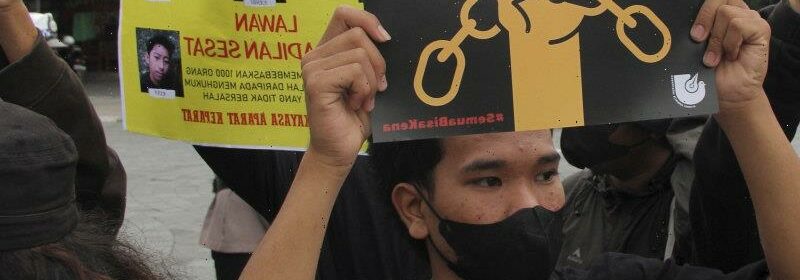Indonesia’s lurch to the right erodes hard-won freedoms

Home to the world’s largest Muslim population, Indonesia may have a history of sporadic incidents of religious extremism, but has mostly been considered a tolerant nation with healthy democratic institutions. This week, that took a notable step backwards.
After decades of failed attempts, the Indonesian government almost unanimously passed a new criminal code on Tuesday, replacing a version dating back to 1918 when Indonesia was a Dutch colony. Its provisions outlawing sex outside of marriage have garnered the most attention, but the full extent of the new laws, which will come into force in three years’ time, are quickly attracting, for very good reason, local and international criticism.
Activists hold up posters during a rally against Indonesia’s new criminal law.Credit:AP
Sex outside marriage will become punishable by one year in jail while those who cohabitate while unmarried face six months behind bars. This has heightened concerns for foreigners travelling to tourist destinations such as Bali, but a provision that means police can only make an arrest after a report is filed by a close family member will rule out most issues for tourists.
For locals, however, the consequences could be dire for those in a non-marital relationship that is not approved by a family member. And it will open the way for further prosecution of the LGBTQ community. Homosexuality is not illegal in Indonesia (except in the province of Aceh) but because they cannot marry, the new laws will in effect criminalise these relationships. The new code also imposes long sentences on a woman who has an abortion and those who carry them out, although there are exceptions for rape victims and medical emergencies.
The new laws also go well beyond the bedroom. It bans insults directed at the president and vice president, a provision that was scrubbed out by the Constitutional Court in 2006, with jail penalties up to 4½ years. It also criminalises insults against government and state institutions, outlaws unsanctioned public demonstrations deemed to be disturbing public order and expands laws against blasphemy.
Amnesty International’s Indonesia executive director, Usman Hamid, was vocal in his criticism: “What we’re witnessing is a significant blow to Indonesia’s hard-won progress in protecting human rights and fundamental freedoms over more than two decades… This can cement a climate of fear that stifles peaceful criticism and freedom of assembly.”
What appears most worrying is that this crackdown is hardly a one-off. Politics in Indonesia has for some years been increasingly infiltrated by more conservative forces. The nation’s President, Joko Widodo, may have talked up his credentials as a moderate when he first entered office in 2014, but over the years he has been forced to veer to the right as he faced increasingly conservative opponents. This has led to a broad shift towards a more Arab-style devotion that is far stricter on such things as dress code and public and private behaviour.
For Australia, which has for many years been trying to forge closer ties with its northern neighbour, it will surely generate some difficult conversations. Not that Indonesia appears fussed by offending Australia at the moment. Indonesia’s early release of Bali bomb maker Umar Patek this week went ahead despite protests from Prime Minister Anthony Albanese, who described the former Jemaah Islamiyah militant as “abhorrent”.
At a time when Australia is attempting to build alliances in the region to counter the growing influence of China, it is regrettable that Indonesia has taken such a regressive step regarding human rights and freedom of movement. It also appears willing to thumb its nose at Canberra over such a sensitive issue as the Bali bombing. Australia clearly has its work cut out in making its objections heard over recent decisions in Indonesia while maintaining good relations.
Michael Bachelard sends an exclusive newsletter to subscribers each week. Sign up to receive his Note from the Editor.
Most Viewed in World
Source: Read Full Article
